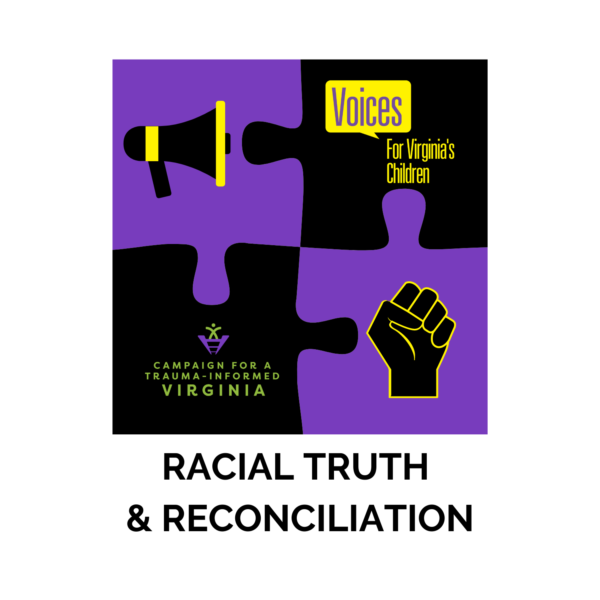

Our mission for Racial Truth & Reconciliation Week is to empower the voices and experiences of marginalized communities in acknowledgement of truth to promote healing, reconciliation, and justice. Reflecting on this mission and in our collaboration with various trauma-informed community networks in Virginia, we asked leaders of color from these various networks to share their own stories.
Below you’ll read from Brian Little from the Southside Trauma-Informed Community Network. Here Brian shares more about the Southside Trauma-Informed Community Network and their experiences in dealing with justice and reconciliation:
Thank you for inviting me into your space to discuss truth and reconciliation and to also give you a Southside Trauma-Informed Community Network perspective. Our mission is to promote and to enhance individual and community resilience through:
We have had the opportunity to host two impactful summits that help people first identify trauma and secondly work through trauma to build resilience. Whether that resilience is found within the home, community, work place, church, or one’s individual health and well-being, we want to be able to support and allow space for that healing process to be born and to find its place among the world we live in.
Our last summit was almost a year ago and I will say that it certainly shed light on many of the types of trauma that we are experiencing today. That summit was entitled Race, Culture and Poverty, and there were several opportunities to dive into discussion and dig deeper into the trauma within these areas. It seems as though the Southside TICN naturally fell into the theme of equity, equality, and cultural humility as we have a diverse membership. The truth of the matter is that people of color tend to look at other people of color in leadership to help change the narrative about the Black (or color) experience and the trauma related to it. If you show up in a room filled with white people and the subject turns to race and ethnicity, oftentimes the people of color are tagged as being “it”! Therefore, we have to be ready to share our thoughts and ideas if we want to be a part of educating while oftentimes emoting about the lack of representation and intentionality without being labeled radical.
I don’t know about others, but I want to proudly be uniquely me. As a 57 year-old man who has a classical music, plant science, horticultural, and historical museum management background, among other things, I have oftentimes shown up in places where people aren’t traditionally expecting to see a black man. So, as a black man leading a trauma network in these times of challenge and change, I knew that we had to take on the theme of justice to try and begin the process of reconciliation. While this is not Southside TICN’s only focus, it is what is resonating among the people. It is where the energy is and this pandemic is disproportionately impacting people of color. The truth of the matter is people of color are dying at higher rates from COVID-19 and communities of color are being stripped of their elders, the wisdom wells. The people who help to make the village are missing, and children are being left to figure it out on their own. Food deserts are growing as localities try to help feed children. Even something as basic as clean water cannot always be found. We do know that network members in communities have been working hard to fill the gaps in places where needs are found.
In the media, we have seen violence and murder played out in real time. It is sobering, but the truth of the matter is we all can see clearer as we hover in place and try to stay safe. The black community and the injustices found in our history now have the opportunity to change the trajectory of America’s future. If we look at the history books, we find that in the years following Reconstruction, the South reestablished many of the provisions of the black codes in the form of the so-called “Jim Crow laws.” These laws remained firmly in place for almost a century, but were finally abolished with the passing of the Civil Rights Act of 1964, which allowed people of color the opportunity to vote. I was one year old when that happened.
Looking at our history can be a hard task to accomplish. It could set off rage, retaliation, deep hurt, and of course, trauma, but we must do the work to help everyone have the opportunity for the conversation.
Acts of Reconciliation could include:
Remember, as Oprah Winfrey once said, “leadership is about empathy.” She also said, “turn wounds into wisdom.” If we can do that, the idea of truth and reconciliation can become real in our lives, in our home, in our work, and in our places of worship. Think about that today.
Read more stories here and learn more about Racial Truth & Reconciliation Week here.
Read More Blog Posts